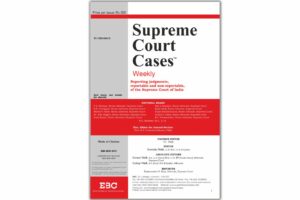2021 SCC Vol. 7 Part 3
In Part 3 of Volume 7 read the tribute to Soli Jehangir Sorabjee, former Attorney General of India by Madhavi Goradia Divan, Additional Solicitor General of India.
A tribute to Soli Jehangir Sorabjee: A tribute to Soli Jehangir Sorabjee, former Attorney General of India by Madhavi Goradia Divan, Additional Solicitor General of India. Soli Jehangir Sorabjee — Spirit Of Liberty — Ingenious And Piercing — Neither Shackled Nor Restricted by [Madhavi Goradia Divan, [(2021) 7 SCC (J-17)]
A tribute to Soli Jehangir Sorabjee: A tribute to Soli Jehangir Sorabjee, former Attorney General of India by Vikram Raghavan a lead counsel at an international organization. Soli Jehangir Sorabjee — Sentinel of the Constitution by [Vikram Raghavan, (2021) 7 SCC (J-20)]
Arbitration and Conciliation Act, 1996 — S. 34 r/w Ss. 2(1)(c), 29-A, 31, 32, 33 and 36 — Limitation period for filing an application: The period of limitation for challenging the award under S. 34 commences from the date on which the party making the application has “received” a signed copy of the arbitral award, as required by S. 31(5) i.e. only after a valid delivery of the award (including dissenting opinion, if any) takes place under S. 31(5). Supply of opinion of the dissenting arbitrator at the same time as when award rendered by the majority arbitrators/final award is delivered is mandatory. Signing of award by all arbitrators, including by dissenting member of Arbitral Tribunal, if any, is also mandatory and not an empty formality. [Dakshin Haryana Bijli Vitran Nigam Ltd. v. Navigant Technologies (P) Ltd., (2021) 7 SCC 657]
Civil Procedure Code, 1908 — Or. 7 Rr. 11, 2(2) and S. 96 — Rejection of plaint — Appealability of: Order of trial court rejecting plaint, held, is covered in definition of “decree” in S. 2(2) CPC. Hence, such order of trial court is subject to a first appeal under S. 96 CPC. Thus further held, as the proper remedy against an order rejecting plaint is first appeal under S. 96 CPC, writ petition under Art. 227 of the Constitution against the order rejecting the plaint was rightly dismissed by High Court. However, appellant-plaintiff granted liberty to pursue such first appeal against the order rejecting the plaint. [Sayyed Ayaz Ali v. Prakash G. Goyal, (2021) 7 SCC 456]
Constitution of India — Arts. 21 and 19 — Right to identity — Scope: Sanctity of identity and protection of identity of individual is guaranteed under the Constitution. Principles summarised regarding control of one’s name and freedom to modify or change one’s name. [Jigya Yadav v. CBSE, (2021) 7 SCC 535]
Consumer Protection Act, 1986 — Ss. 13(2)(a) and (b) — Limitation period for filing of reply/response to complaint by respondent/opposite party: Law laid down by five-Judge Bench in Hilli, (2020) 5 SCC 757 that limitation mandatorily cannot be extended beyond prescribed period of 45 days (i.e. period of 30 days along with discretionary extension of time up to 15 days), held, operates prospectively. [A. Suresh Kumar v. Amit Agarwal, (2021) 7 SCC 466]
Contempt of Court — Civil Contempt — Interpretation/doubt as to order — Wilful disobedience/contumacious conduct — What is: In this case, the Court held that even accepting the contentions of the contempt petitioners for the sake of argument, view taken by alleged contemnors, held, being a possible view/interpretation of the judgment in question, they cannot be held liable for contempt of court. [Abhishek Kumar Singh v. G. Pattanaik, (2021) 7 SCC 613]
Education Law — Professional Colleges/Education — Medical and Dental Colleges — Admission — Admission procedure — Generally: Departure from statutorily prescribed procedure is not permissible. Direction of High Court to State Government to allow for admissions to BTech degree courses on basis of marks obtained in qualifying examination is contrary to provisions contained in S. 3(1) of the 2007 Act, as admission has to be on basis of the statutorily prescribed procedure. High Court was not justified in issuing a mandamus to State Government in teeth of provisions of statute, more particularly S. 3(1) of the 2007 Act. Direction of High Court set aside. [State of Odisha v. Orissa Private Engg. College Assn., (2021) 7 SCC 468]
Income Tax — Mutuality Doctrine: Applicability and basis of Mutuality Doctrine, explained in detail. [Yum! Restaurants (Mktg.) (P) Ltd. v. CIT, (2021) 7 SCC 678]
Insolvency and Bankruptcy Code, 2016 — Ss. 29-A and 35(1)(f): Party ineligible under S. 29-A IBC to submit a resolution plan under IBC is not eligible to file an application for compromise and arrangement in terms of Ss. 230 to 232 of the Companies Act, 2013. The validity of Regn. 2-B of the Insolvency and Bankruptcy Board of India (Liquidation Process) Regulations, 2016, imposing such bar/restriction, affirmed. [Arun Kumar Jagatramka v. Jindal Steel & Power Ltd., (2021) 7 SCC 474]
Service Law — Judiciary — Seniority — Higher Judicial Services: Seniority inter se amongst candidates promoted through limited competitive examination (LCE), determined. [Prem Narayan Singh v. High Court of M.P., (2021) 7 SCC 649]

